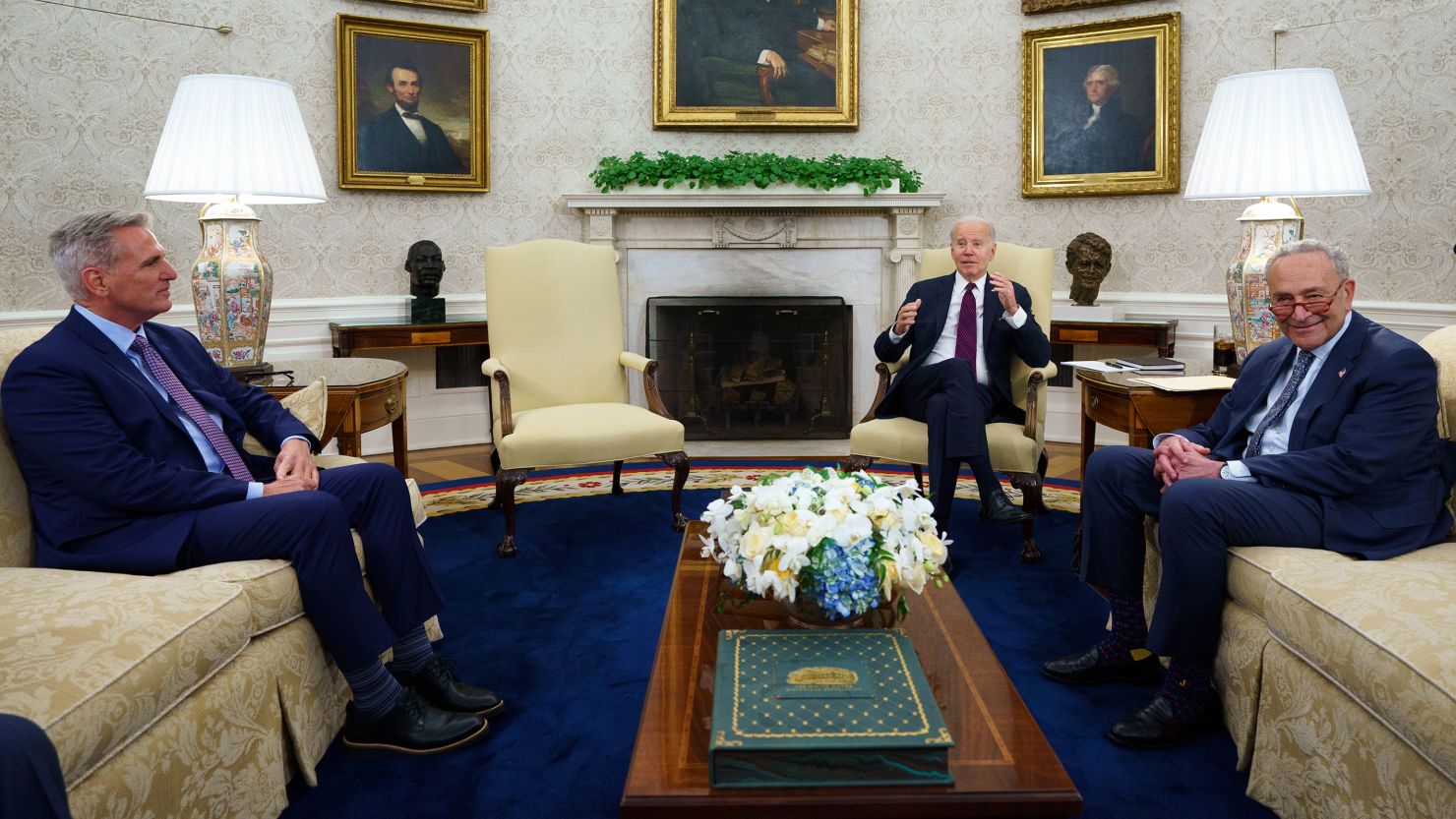After a week of meetings on the debt ceiling, Congress, the White House and the country still do not have a clear path forward to avoid a cataclysmic default with just four days when both the House and Senate are scheduled to be in session before June 1, when the US could default on its obligations. On one hand, it looks like this could go to the brink. On the other, there have been pockets of progress over the intervening days and signs that some of the most stringent and hardened positions negotiators have been echoing over the last three months are slowly beginning to soften.
After meeting Friday for a third straight day, House, Senate and White House negotiators still don’t have a deal but are expected to continue to talk over the weekend, according to a source familiar with the matter.
Two sources involved in the talks said there has been progress but there’s a long way to go. One source said it takes months to hammer out a fiscal deal, but they are trying to do that in just a matter of days.
The rhetoric has still been hot with Senate Majority Leader Chuck Schumer sending a letter to his members this morning urging Republicans to “take default off the table” and House Speaker Kevin McCarthy telling CNN on Thursday of the intensive staff meetings that have played out over the last two days. “I don’t think they’re that productive. What I truly believe here, looking at the actions of this president, he doesn’t want to deal, he wants to default,” he said.
There is still so much work ahead and members who are on the sidelines of these now tightly held negotiations are placing a lot of faith in their respective leadership to cut a deal at a scale that McCarthy and Biden have never done together before. But, behind the scenes, there are finally talks after months of no communication over the issue. It’s important not to lose sight of the fact that it, in and of itself, is a major shift.
What to watch:
Progress is slow. That’s the reality. Behind the scenes, the negotiations between staff have been productive, respectful and in “good faith,” according to people on both sides. Those are all words that bode well for the direction this is going. What staffers didn’t want to happen was a repeat of Tuesday: a high stakes meeting followed by dueling press conferences where everyone argued there hadn’t been much progress.
In a press briefing Friday, White House press secretary Karine Jean-Pierre also said staff level talks would continue over the weekend. She did not have an update on timing for the next principles meeting, only saying it would be “early next week.”
It’s just not productive for the principles to re-litigate their talking points in the Oval Office and staff had not gotten themselves to a place yet where there was enough for Biden and McCarthy to actually negotiate on. McCarthy told CNN on Thursday that “The White House didn’t cancel the meeting, all of the leaders decided it’s probably in the best of our interest to let the staff meet again before we get back together.”
What they’ve been doing:
Over the last several days, aides have been trying to lay out the parameters of what they are negotiating. It’s a key and tedious task, but it’s significant because it indicates that there is going to be negotiation over the debt ceiling after months of posturing from Democrats that they were not going to negotiate with the full faith and credit of the United States.
The scope, the terms and the order that things are voted on? That’s all very much in play right now. As CNN reported earlier this week, the White House has signaled they are open to talking about areas like the budget, work requirements and permitting reform. The White House has made clear they don’t want to repeal parts of the Inflation Reduction Act, which was included in the GOP’s debt ceiling bill. How this shakes out and what the contours of the negotiation will actually be are still a work in progress. But another positive sign so far in these negotiations is that over the last few days, leaks have been rare as both sides try and build trust to move ahead with these negotiations.
The timeline:
It’s essential to keep in mind that the timeline is critical here. It takes time to draft legislation, put it on the floor in the House and move it through the Senate. If June 1 really does become the critical ‘X’ date, a deal in principle or a framework probably needs to be hammered out by sometime late next week, aides have said. McCarthy also laid out that timeline to reporters earlier this week.
And while there are only four days when lawmakers are scheduled to be in DC together, it’s possible members could be called back if a deal is made and a vote needs to happen, and principles can always work through recesses, stay in town or negotiate over the phone.
CNN’s Manu Raju, Haley Talbot and Arlette Saenz contributed.
